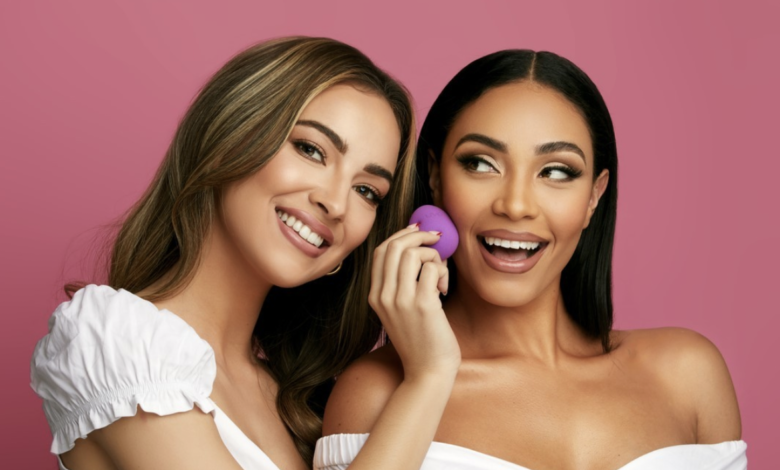Antimicrobial Beauty Products: Everything You Need to Know

[ad_1]
Hadn’t considered sanitizing your makeup? Here’s what you need to know about antimicrobial beauty products including, of course, if you need to be using them.
In the last year, we’ve collectively thought about, talked about, and purchased items like hand sanitizer and sanitizing wipes at unprecedented rates. The “hand hygiene” category, which includes sanitizers, cleansers, soaps and wipes, is expected to continue to grow, reaching an anticipated $17.2 billion USD in sales by 2026.
Once the COVID-19 pandemic hit, beauty brands quickly got to work, releasing hand sanitizers as part of their product offerings, and they’re continuing to do so, with both drugstore brands like Dove and newer brands like CTZN Cosmetics not only getting in on the sanitizer game with their newest launches, but working to improve the existing category. Dove’s hand sanitizers include moisturizing properties and are thus not stripping and drying like many sanitizers tend to be, and also address the issue of scent, a common complaint when it comes to traditional hand sanitizers. Rather than a strong alcohol smell, Dove offers a Shea Butter and Warm Vanilla scent option.
At the end of January, CTZN Cosmetics launched CTZN Care, a multi-purpose sanitizer spray that can be used to sanitize hands, masks and even lipstick and lip products in between use. “There are already many sanitizers out there, so we knew we wanted to create a non-sticky spray formula over a traditional gel that has a strong alcohol smell,” says Aleena Khan, Co-Founder of CTZN Cosmetics. “But beyond that, we realized that with this heightened awareness of personal and public hygiene, there is also a demand for the sanitization of makeup products. This spans from makeup artists that work on multiple clients, beauty stores that need to sanitize testers between usage, brands that need to sanitize testers at pop-ups, even friends who may share a lip product! So we worked on a formula with a lab that has been FDA-approved for usage on hands, fabrics (like masks), and lip products.”
Hadn’t considered sanitizing your makeup? You’re not alone. But John Nguyen, founder of UVé Beauty, did. At the end of 2020, UVé Beauty launched the world’s first range of antimicrobial beauty tools and products, featuring antimicrobial blending sponges, makeup brushes and UV-C sterilization systems that had been in research and development for years before we’d ever even heard of COVID-19. “We started developing UVé Brush Sterilizers over four years ago, long before COVID-19 started,” says Nguyen. “The provisional patents were filed a few years ago and we started to develop our brushes and sponges in the middle of 2019. We saw the need for our products years before COVID came into our lives.” Sure, we’ve always known that regularly cleaning makeup brushes and sponges is crucial for preventing bacteria growth, acne, pink eye, and even more serious infections like E-Coli and Staphylococcus, but because of the pandemic, maintaining good hygiene in all aspects of our lives has never been more important. “It’s funny that we’ll spend hundreds and thousands of dollars on skincare products but we forget to properly clean our tools, like brushes and sponges, daily,” says Nguyen.
“Our products are manufactured and treated with medical grade agents to allow them to repel bacteria from growing on their surface, up to 99.9%” says Nguyen. “All of our brushes and sponges carry this same technology.” That being said, Nguyen clarifies that UVé Beauty products have not been tested on the COVID-19 virus (fair enough — there are bigger COVID fish to fry at the moment), so while the brand can’t make that specific claim, based on the compounds of the antimicrobial agents in the products, Nguyen says that it’s certainly possible.
It’s not just beauty brands that are getting in on the antimicrobial action. Glassie is an LA-based tech company who recently launched an antimicrobial (and customizable!) phone screen protector that is 99% effective in killing germs and bacteria due to a permeation process with copper and silver ions. “The lab test results show it prevents growth of bacteria and surface germs on the screen, which has been shown to have the most germs of anything you touch on an average day — two times dirtier than a toilet seat,” Glassie founders Neels Visser and Christian Sagert tell us. Like UVé Beauty, Glassie’s antimicrobial screen protector has been in the works since pre-COVID days. “The last thing we wanted to do was to put ourselves in a position [where we’re] saying ‘buy our product’ at a time when more important things need to be discussed,” explain Visser and Sagert. However, if a product has the potential to maximize hygiene practices and possibly help in keeping our phones screen, we’re all for it.
Oh, and yes, you should still wash your makeup tools and clean your phone screen, even if you’re using antimicrobial products. As Nguyen explains, using UVé tools will help users on a quest for clearer skin because the antimicrobial agents work to prevent 99.9% of bacteria forming on the products. But, as he points out, “People also need to realize that they should be washing their tools with an antibacterial soap [in order to] kill bacteria.” And if you’re using an antibacterial soap to wash antimicrobial sponges and brushes? Think of it as doubling up on insurance for your skin.
Of course, more research needs to be done in terms of how effective antimicrobial beauty products are in the fight against COVID-19. The bottom line? Using antimicrobial products certainly can’t hurt.
[ad_2]
Source link






